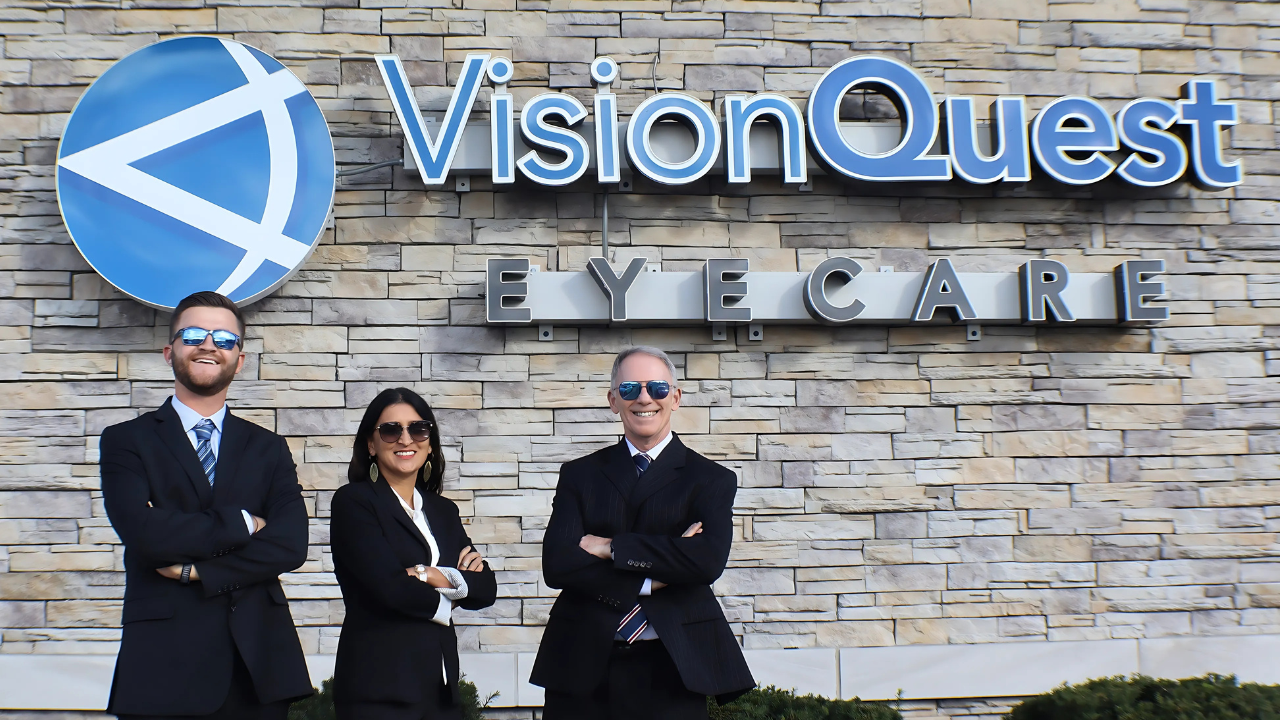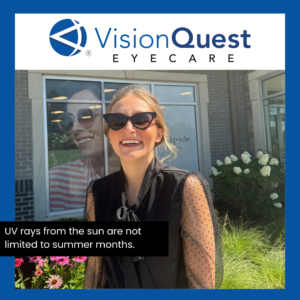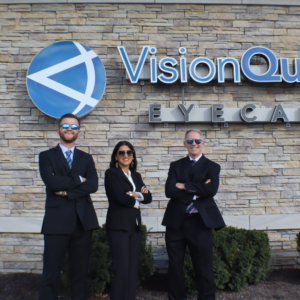When people think of sunglasses, they often associate them with sunny summer days. However, protecting your eyes from ultraviolet (UV) rays is just as important in winter. The cold months bring unique challenges to eye health, and wearing sunglasses year-round is a key part of maintaining good vision. At VisionQuest Eyecare, with locations in Greenwood and Fishers, Indiana, we emphasize the importance of UV protection in all seasons. Here’s why sunglasses should remain a part of your daily routine, even in the winter.
Why UV Protection Matters Year-Round
UV rays from the sun are not limited to summer months. They are present every day, regardless of temperature or season. Overexposure to UV radiation can cause both short-term discomfort and long-term damage to your eyes, including conditions like cataracts, macular degeneration, and photokeratitis (a painful sunburn of the eye).
Winter’s Unique Risks
Winter conditions often amplify the effects of UV exposure. Snow, ice, and even wet roads can reflect up to 80% of UV rays, increasing your exposure. This is particularly important in Indiana, where winter snowstorms can create intense glare that’s harmful to the eyes.
The Benefits of Wearing Sunglasses in Winter
Shielding Against Harmful UV Rays
High-quality sunglasses block 99% to 100% of UVA and UVB rays, reducing your risk of long-term eye damage. Look for sunglasses with a UV400 rating, which ensures full protection against these harmful rays.
Reducing Glare for Safer Vision
Glare from snow and ice can impair vision, making activities like driving or walking outdoors more hazardous. Polarized lenses are particularly effective in minimizing glare, improving clarity, and reducing eye strain.
Preventing Dry Eye Syndrome
Cold winter winds can exacerbate dry eye syndrome, a common condition where your eyes don’t produce enough tears for proper lubrication. Sunglasses act as a barrier, protecting your eyes from harsh winds and helping retain natural moisture.
Preserving Skin Health Around the Eyes
The skin around your eyes is delicate and more susceptible to UV damage. Wearing sunglasses protects this sensitive area from premature aging, wrinkles, and even skin cancer.
Choosing the Right Sunglasses for Winter
Not all sunglasses offer the same level of protection. Here are some tips for selecting the best pair for winter wear:
UV Protection
Always check for a label that guarantees 100% UVA and UVB protection. Sunglasses without UV protection can do more harm than good by dilating your pupils and letting in more harmful rays.
Polarized Lenses
For snowy or icy conditions, polarized lenses are a game-changer. They reduce glare, improve depth perception, and enhance color contrast, making them ideal for driving or outdoor activities in the winter.
Wraparound Styles
Glasses with wraparound frames provide additional protection by shielding your eyes from UV rays entering from the sides. They also block cold winds and debris, offering extra comfort during outdoor activities.
Tinted Lenses
Different tints can enhance your vision in specific winter conditions:
- Gray lenses: Neutral color that reduces overall brightness without altering color perception.
- Amber or yellow lenses: Enhance contrast and depth perception in low-light or overcast conditions.
Protecting Children’s Eyes in Winter
Children’s eyes are more vulnerable to UV damage because their lenses are less capable of filtering out UV rays. With their love for playing outdoors in the snow, kids are at an increased risk of UV exposure. Ensuring your child wears properly fitted sunglasses with UV protection is an essential step in safeguarding their eye health.
Common Misconceptions About Winter UV Protection
“I Don’t Need Sunglasses on Cloudy Days.”
UV rays can penetrate clouds, making overcast days just as risky for your eyes as sunny ones. Sunglasses are necessary even when the sun isn’t visible.
“Winter Sunlight Isn’t as Strong.”
While the sun may feel weaker in winter, UV rays remain constant year-round. In fact, the angle of the sun in winter months often results in more direct exposure to your eyes.
“Snow and Ice Are Harmless.”
The reflective properties of snow and ice amplify UV exposure, increasing the likelihood of eye damage during winter activities like skiing, snowboarding, or even walking outdoors.
How VisionQuest Eyecare Can Help
At VisionQuest Eyecare, we understand that protecting your vision is a year-round commitment. Our team in Greenwood and Fishers, Indiana, can guide you in selecting sunglasses that provide maximum UV protection and fit your lifestyle.
Our Services Include:
- Comprehensive Eye Exams: Evaluate your overall eye health and detect UV-related issues.
- Prescription Sunglasses: Combine UV protection with vision correction for optimal convenience.
- Pediatric Eye Care: Ensure your child’s eyes are protected from harmful UV rays.
- Dry Eye Treatment: Address the discomfort caused by winter conditions and enhance your eye comfort.
Tips for Maintaining Winter Eye Health
Wear Sunglasses Daily: Make it a habit to wear sunglasses whenever you’re outdoors, regardless of the weather.
Use Protective Gear for Winter Sports: Goggles with UV protection are a must for skiing, snowboarding, or other snow activities.
Stay Hydrated: Drink plenty of water to keep your eyes and body hydrated.
Limit Screen Time: Winter often means more time indoors staring at screens, which can exacerbate eye strain. Follow the 20-20-20 rule: every 20 minutes, look at something 20 feet away for 20 seconds.
Schedule Your Eye Care Appointment Today
Winter eye health is crucial for protecting your vision and preventing long-term damage. Whether you need assistance selecting the perfect pair of sunglasses or addressing winter-specific eye concerns, VisionQuest Eyecare is here to help. Visit our offices in Greenwood or Fishers, Indiana, for personalized care tailored to your needs.
Make an appointment online today by visiting VisionQuest Eyecare or calling us directly. Don’t let winter weather compromise your eye health—take proactive steps to protect your vision all year long.

Dr. Anjali Shah is an optometrist at VisionQuest Eyecare with a passion for helping others. She graduated from the State University of New York College of Optometry, with advanced training in pediatrics and ocular diseases through her internship and residency. She is a national speaker in the field of myopia management, qualified to prescribe advanced myopia management treatments to slow the condition’s progression.



